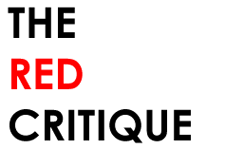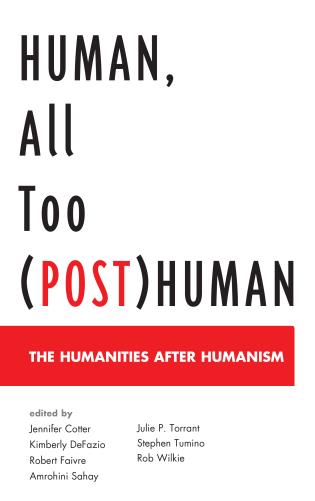
Human All Too (Post)Human: The Humanities after Humanism
Edited By Jennifer Cotter, Kimberly DeFazio, Robert
Faivre,
Amrohini Sahay, Julie P. Torrant, Stephen Tumino, Rob Wilkie

The contemporary has marked itself off from
modernity by questioning its humanism that centers the world around the
human as the moral subject of free will and self-determination, the
bearer of universal essence that is the basis of human rights. Modernism
normalizes humanism through language as referential, a set of
interrelated signs that correspond to the empirical reality outside it.
Humanist modernity, in other words, is seen in the contemporary as a
regime that, by separating the human from the non-human and insisting on
language as correspondence, not only fails to engage the emerging forms
of social relations in which the boundaries of human and machine are
fading but is also indifferent to the difference between the “other”’s
life and other lives. Human, All
Too (Post)Human: The Humanities after Humanism argues that
the Nietzschean tendencies that provide the philosophical boundaries of
post-humanism do not undo humanism but reform it, constructing a
parallel discourse that saves humanism from itself.
Grounded in materialist analysis of social life,
Human, All Too (Post)Human
argues that humanism and post-humanism are cultural discourses that
normalize different stages of capitalism—analog and digital capitalism.
They are different orders of property relations. The question, the
writers argue, is not humanism or post-humanism, namely cultural
representations, but the material relations of production that are
centered on wage labor. Language, free will, or human rights are not the
issues since “Right can never be higher than the economic structure of
society and its cultural development conditioned thereby.” The question
that shapes all questions, in
Human, All Too (Post)Human is freedom from (wage) labor.
Human, All Too (Post)Human is an
uncommon book; it is a philosophically insightful and erudite analysis
of the contemporary situation with deep political commitment to social
change. It is a piercing root critique of governing ideas and the social
conditions that produce them at a time when critique itself has become
the target of accommodationist thinkers such as Bruno Latour in order to
sideline such un-assembling of the social. Written against the horizon
of Marx’s Critique of the Gotha Program,
Human, All Too (Post)Human,
breaks the silence on what has become unspeakable in contemporary
cultural critique and argues not for freedom from humanism or
post-humanism, which have haunted bourgeois thought, but for a future
free from wage labor.
— Peter McLaren, Honorary Chair Professor and Director of the Center for
Critical Studies, Northeast Normal University, China
https://rowman.com/ISBN/9781498505734/Human-All-Too-(Post)Human-The-Humanities-after-Humanism